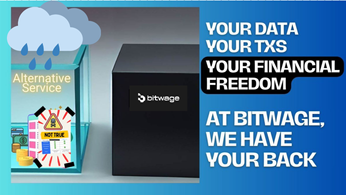
How to Pay Employees With Cryptocurrency
Learn the benefits of paying workers with cryptocurrency,
Table of Contents
Wondering how to you pay your employees with cryptocurrency? Look no further! In this post, we will explain everything you need to know about paying employees or overseas contractors with cryptocurrency. Let's dive in.
🎯Why Pay Employees in Cryptocurrency?
There are so many different ways to pay employees or contractors nowadays that the question arises, why consider cryptocurrency as a payment method for your employees?
First of all, the cryptocurrency payment approach not only appeals to tech-savvy employees but also has a global reach, is cost-effective, and extremely fast compared to various counterparts. So, can salary be paid in crypto? Absolutely! In fact, people all over the world are asking how to get paid with crypto.
Let's explore why people get paid in crypto and how people get paid in crypto.
Global Accessibility
Cryptocurrencies are not limited to borders. This on its own is a huge plus for cryptocurrency. Various countries worldwide do not accept international payments using the traditional banking system. Since cryptocurrency is decentralized and conducted on the blockchain, payments can be made anywhere in the world, almost instantly, with no middleman.
Faster Transactions
Traditional bank transfers can take several days to process fully, even more, if they are international transfers. Crypto transactions on the other hand are a ton faster, they usually complete within minutes of being sent and location is not an issue. No matter where in the world you are, you can receive a crypto transaction in a matter of minutes.
Lower Transaction Costs
Cryptocurrency transactions compared to traditional banking counterparts are much cheaper. Banks have costs to cover, including intermediary fees, employee salaries, and building rent. These added costs for banks make their transactions quite expensive and these costs ultimately fall in your hands. For businesses with international workers, this can mean significant savings, especially if you have a larger remote workforce.
Employee Attraction and Retention
One of my favorite points of using cryptocurrency for salary payments or "crypto payroll" is that cryptocurrency payments attract employee attention. Crypto payroll can be a unique perk that sets your company apart from the competition. Tech-savvy employees who are enthusiastic about digital currencies and blockchain technology will be attracted by the fact that your company offers crypto payroll. This also leads to better employee retention. Getting paid in cryptocurrency for some may be seen as a company perk and they may choose to stay in your company just because of this added perk.
🎯Challenges of paying in cryptocurrency
While conducting payroll in crypto has benefits like the ones mentioned above, some questions arise about paying employee salaries with cryptocurrency. Can a company pay in cryptocurrency? Do you pay taxes on crypto salary?
Lets find those answers below.
Volatility
We all know that cryptocurrencies are well known for their price volatility and the profits that can be made from such price swings. When it comes to trading though, where there are profits to be made, there are losses to be made. With that in mind, paying your employees with cryptocurrency can lead to your employees receiving either more or less than expected, which by nature, is a no-go for traditional employees. However, there is a solution known as "stablecoin payroll". Stablecoins (digital assets that are pegged 1:1 with their fiat counterpart) like USDT remove the inherent volatility risk that paying in cryptocurrency can bring since you can pay your employees in USDT and they will receive the exact amount of USDT as they would of USD but in a digital decentralized token instead. Not only can you pay workers with Stablecoins, but due to the nature of how cryptocurrencies work, by paying in stablecoins you also get access to specialized talent in the field that you need, when you need it.
Regulatory Compliance
This is a tough one. The legal status of cryptocurrencies varies by country or region. You, as a business owner, must ensure that you are compliant with local laws and tax regulations when conducting crypto payroll. Most countries or regions have no problems with cryptocurrency payments while others have completely outlawed it. It is up to the company or business to make sure they are compliant. While it's legal to pay with cryptocurrencies, some countries see cryptocurrencies as a liability, so it is important to read more about compliance or talk to a professional.
Tax Implications
While tax reporting is a pain on its own, crypto payments can complicate tax reporting for both employees and employees. So yes, naturally most financial transactions have taxes, so yes, you have to pay taxes on crypto salary. Some countries do not have a crypto tax for buying, selling, mining, or trading cryptocurrency, like Belarus or El Salvador. Remember, always consult with a tax professional to ensure proper reporting is done. Worker classification is also important since this could lead to hefty fees due to wrong categorization. Read more about the different work classifications.
🎯How to Implement Cryptocurrency Payments
While the simple solution would be through Bitwage, in this post we will also outline what you would need to do manually to get set up for crypto payroll.
How to pay employees in crypto using Bitwage
You can get started with crypto payroll in just a few steps through Bitwage.
- Step 1: Go to Bitwage.com and choose "Business Sign Up".

- Step 2: Fill out the Bitwage Business account creation fields with your information

- Step 3: Verify your email

- Step 4: Enter your phone number

- Step 5: Proceed and complete your business details

- Step 6: Fill out your business details, make sure to include Tax ID and if you are registered, registering or not required to register with FINCEN


- Step 7: Fill out the Business Activity and provide information about your business and funding.

- Step 8: Provide your business address

- Step 9: Provide the names of individuals who are Beneficial Owners.

- Step 10: Fill out the account admin information

- Step 11: Fill out any additional admin details required

- Step 12: Verify your identity

And that's it! Simply wait for your account to be approved and you can start conducting crypto payroll for your employees through Bitwage!
Check this out to learn how to create your first payroll once your account has been approved.
How to conduct crypto payroll without Bitwage
While Bitwage makes the process 10x simpler, in this post we will also explain how to pay your employees in crypto on your own.
- Choose the Right Cryptocurrency
Select a cryptocurrency that aligns with your company's and employees' needs and preferences. While Bitcoin, Ethereum, or BNB are popular choices due to their large liquidity and adoption, these major currencies may not be what's best for your company. Instead, opt for stablecoin options like USDT or USDC that will guarantee your employees receive the same value as if they were getting paid with fiat currency. - Set Up a Digital Wallet
Both you as a company and your employees must have a digital wallet to send and receive funds. Choose a digital wallet that is both secure and well-known around the space. Some major ones to choose from are Metamask, TrustWallet, Exodus, Crypto.com, Coinbase Wallet, and Gemini. Make sure that the wallet you choose supports the cryptocurrency and the network that you want to send your funds through, as sending through the wrong network can cause you to lose total access to the funds, and since cryptocurrency is completely decentralized, no one will be able to help you recover those funds. - Educate Employees
Make sure your employees know how to receive, send, and convert their cryptocurrency to fiat currency. Provide resources and training to help your employees better understand how to use the digital wallet they have set up, how to manage their crypto assets, and how to comply with their local tax requirements. This is an ongoing process that will require you to stay up to date with how blockchain technology develops as new features and ways to send, receive, and use cryptocurrency arise daily. - Create a Business Account on a Cryptocurrency Exchange
Choose one of the various cryptocurrency exchanges available and create a business account with them. Go through the KYC process and explain how your business is going to use cryptocurrency. Make sure your business is registered and you take into account the various fees that the exchange may charge you for using them for your business while also taking into account that they will have higher demands for you to set up a business account (volume, legal, etc) and may even reject your account.
🎯Conclusion
There are several benefits to paying your employees in cryptocurrency. The benefits are for both parties, businesses and employees. This forward-thinking approach, known as crypto payroll, can make your business more appealing to top talent while also allowing your remote international employees to receive their salary without the hassle of traditional banking systems.
Understand and take the necessary steps to implement crypto payroll into your business and stay ahead of the curve while appealing to professionals interested in digital currencies or blockchain technology. While conducting crypto payroll on your own can seem like a huge hassle and not worth the time and effort, services like Bitwage streamline this process by making the process 10 times easier.
FAQ
How do you pay people in crypto?
It's simple! Follow the steps in this post to begin to pay your employees or contractors in cryptocurrency! Want to know why Bitwage? Learn more about how Bitwage does against its competitors here.
Is it legal to pay people in crypto?
In most cases, the answer is yes! Some jurisdictions may see crypto payments differently than others. Crypto payments in most countries are legal. Please take into account that employees and contractors must pay taxes on their crypto salary and that incorrect worker classification may lead to potential fines and additional fees.










